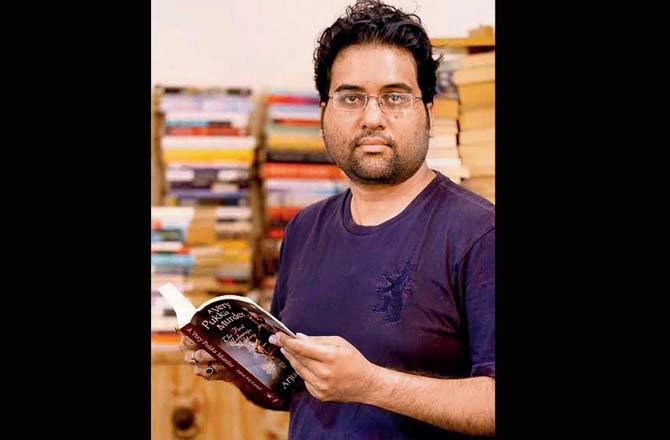What is the life and fate of a debut book that has been posthumously published? Two recently published fiction works show the way

Numair Atif Choudhury Author of Babu Bangladesh! and Rudrakshi Bhattacharjee Author of This Is How It Took Place
In the world of publishing, a debut book functions like an introductory chapter. You are introduced to a new piece of work, a fresh experiment in language and the first-time author. If a reader enjoys this combination, the chapter opens a world of opportunities for the writer.
For two books that released this year, it almost ended where it began. Numair Atif Choudhury's Babu Bangladesh! and Rudrakshi Bhattacharjee's This Is How It Took Place were published posthumously. Both were evidently fine works of literature—one by a discerning scholar and another from a teenager with a distinctive voice. If there was an opportunity lost, it was to get to know the writer better.

Kanishka Gupta
Literary agent Kanishka Gupta believes the most unfortunate bit is that the author was not around to see what became of his work. Gupta had acquired the rights for Choudhury's manuscript from his family, after he died in a drowning incident in Japan last year.
This was almost a year after he had first learned about the novel in November 2017 from Bangladeshi writer Nadeem Zaman, who Gupta was representing. "Nadeem told me that his friend Numair had written a book in the genre of magic realism, and that he thought it was something very special," recalls Gupta. "But, Numair was quite suspicious and wary of parting with the manuscript then."

Shinie Anthony
And, rightly so. The book was a labour of love. Choudhury began writing it somewhere in 2003-2004, as part of his doctorate at the University of Texas in Dallas. After evading Gupta's requests to see the manuscript for months, when Choudhury finally showed it to him, he was blown away. Set in Bangladesh of 2028, it begins with a biographer attempting to document the life of an enigmatic and controversial political luminary called Babu; in the process, he uncovers the story of the nation.
"I had never seen anything like this come out of the subcontinent." Though Choudhury did meet Gupta in Delhi, he refused to commit to a deal. That same year, in September, while in Japan to present a paper on anthropological magical realism at a literary conference, he passed away. "It was heartbreaking. I had lost a friend and we had lost a literary genius... a man of great talent. I was also affected by the thought that this book would never be read. It felt like a great book had been snatched away from us," says Gupta.
Fortunately, Choudhury's sister Talita, who is based out of California, and educator mother Lubna, shared Gupta's sentiments. His sister, in fact, managed to retrieve the final draft of the book from his laptop, and handed it over to Gupta who then sealed the deal with HarperCollins India. "My brother was a bachelor, and these were his babies. This was what he left behind and it meant a lot to him," Talita says in a telephonic interview, explaining why the family decided to part with the manuscript.
In the case of Bengaluru-based Bhattacharjee, editor Shinie Anthony learnt of her work through her mother, an old friend, after the 16-year-old passed away in 2017. "We started to gather her writings, from school magazines, writing workshops, her computer drafts, etc. She had written poems, short stories and a novella. At first, we just wanted to put it all together chronologically and recreate her in some form, as tangible memory. But once we began to read, we couldn't put it away. The search grew frantic as her voice grew on us," says Anthony.
What stood out for her was the "maturity" of her voice. "She was a young teenager, when she thought these stories up, but her understanding of human failings is perennial. There is a kind of eternity to human emotions and that is where she comes in with her set of skills."
Her debut includes a collection of 16 short stories. Writer-poet Jeet Thayil, otherwise known to be selective with book blurbs, was generous with praise, describing Bhattacharjee as "prodigious, gifted and precocious." Her death he called "an incalculable loss to Indian literature".
Bringing a book out in the absence of an author, however, comes with its own set of challenges. Rahul Soni, commissioning editor with HarperCollins India, who took charge of Numair's debut, says that while the manuscript was in excellent shape from having been worked and reworked over the years, there were places, where he "wished we could have worked more."
"Numair himself had marked out [lines] for further expansion. That wasn't possible, and we stayed with what we had. I decided to keep my intervention to the minimum and let Numair's work speak for itself," he says. Anthony and Sohini Basak of HarperCollins, who worked on Bhattarcharjee's book, also chose to make minimal edits. "We had decided to not change the work unless absolutely necessary, and truly, those occasions were very few," says Basak.
It is only post the release that publishers and family members have to contend with a few bitter truths—a good book usually needs a face to go with it. "A lot of media and awards depend on the author being around for interviews and photo-ops. Literary festivals will by and large only host sessions on books where the authors are around," says Soni. Gupta also made a case for posthumously published writers at the recently-held Dhaka Lit Fest, after Choudhury's novel became the first posthumous debut to be nominated for the Shakti Bhatt First book prize in its 13-year history.
"My mum, who is grief-stricken by his death, took it very hard—that deceased authors not considered for certain things. She feels it's an injustice to her son's work. But Numair was a true humanist. And, I often tell my mum, that Numair would have disagreed. In my opinion, he would have said, 'There are many [greater] injustices out there. People are suffering'."
Catch up on all the latest Mumbai news, crime news, current affairs, and also a complete guide on Mumbai from food to things to do and events across the city here. Also download the new mid-day Android and iOS apps to get latest updates
 Subscribe today by clicking the link and stay updated with the latest news!" Click here!
Subscribe today by clicking the link and stay updated with the latest news!" Click here!









